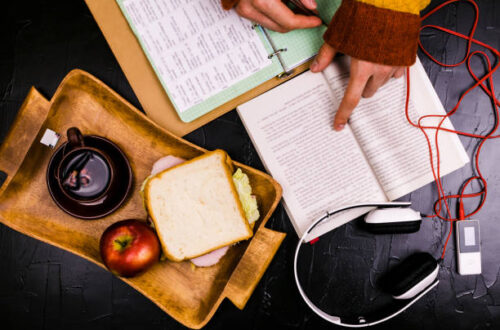In the demanding world of academics, students often face long study sessions, late-night cramming, and the pressure of exams. During these times, it’s easy to reach for sugary, processed snacks or energy drinks for a quick pick-me-up. However, these options often lead to a rapid energy crash, leaving you feeling more tired and less focused than before. Many students fall into the cycle of sugar highs and lows. This can hurt their during exams and overall well-being.
The key to sustained energy and peak mental performance is to fuel your body with the right nutrients. Healthy snacks can act as powerful tools to keep your brain sharp, improve memory, and maintain a steady level of energy throughout the day. It’s about choosing snacks that provide a balance of complex carbohydrates, healthy fats, and protein. These nutrients combine to provide slow, steady energy. This helps you avoid the “sugar crash” that can disrupt your study time.
This guide lists simple, budget-friendly healthy snacks for students. These snacks help boost energy and brain power. We’ll go beyond junk food. Instead, we’ll find tasty options that keep you focused, alert, and ready for any academic challenge. Our goal is to empower you with the knowledge to make smart, simple food choices that will support your academic success and overall health.
Understanding the Fuel: Why Certain Nutrients Matter for Your Brain
Contents
- 1 Understanding the Fuel: Why Certain Nutrients Matter for Your Brain
- 2 Simple and Delicious Snack Ideas to Fuel Your Focus
- 2.1 1. Nuts and Seeds: The Ultimate Brain Food
- 2.2 2. Berries: Nature’s Little Antioxidant Bombs
- 2.3 3. Greek Yogurt: Protein for Sustained Focus
- 2.4 4. Avocado Toast: Healthy Fats for a Sharper Mind
- 2.5 5. Eggs: A Nutrient-Packed Power Snack
- 2.6 6. Whole-Grain Crackers with Hummus or Cheese: The Perfect Combo
- 2.7 7. Dark Chocolate: A Guilt-Free Treat for Your Brain
- 2.8 8. Smoothies: A Nutrient-Packed Meal in a Glass
- 3 The Student’s Guide to Smart Snacking: Planning and Preparation
- 4 Conclusion: Fuel Your Success, One Snack at a Time
- 5 FAQs About Brain-Boosting Snacks
Before we dive into the snacks, let’s take a moment to understand the science behind why certain foods are so good for your brain. Your brain is a complex organ that requires a lot of energy, and the type of fuel you give it makes a huge difference in how it functions. Think of it like a high-performance car; if you put low-quality fuel in it, it won’t run at its best. The same goes for your brain.
The Powerhouse Nutrients: What Your Brain Needs to Thrive
- Omega-3 Fatty Acids: Often called “brain fats,” these are essential for building and repairing brain cells. They can improve memory, learning, and even help to reduce inflammation in the brain. They are the building blocks of a healthy brain. DHA and EPA are the two key types for brain health. You can find them in fatty fish, as well as in some seeds and nuts.
- Antioxidants: You can find antioxidants in berries and dark chocolate. They help protect your brain cells from damage caused by stress and toxins. They work to neutralize harmful molecules called free radicals, which can hurt your brain cells. This protection can improve blood flow to the brain, which enhances cognitive function and helps you think more clearly.
- Complex Carbohydrates: Foods such as whole grains and oats digest slowly. This gives a steady release of glucose, which is the main fuel for your brain. This keeps your energy levels stable and prevents the sharp highs and lows that come from sugary snacks. When your blood sugar levels are stable, you can maintain focus for longer periods of time.
- Protein: Foods high in protein, like eggs and Greek yogurt, help you feel full and focused. They also have amino acids that are important for making neurotransmitters. These chemicals send signals in your brain. They help with mood and concentration. Protein also helps to keep your blood sugar levels steady.
- Vitamins and Minerals: Micronutrients like B vitamins, iron, and magnesium play a crucial role in brain function. B vitamins, for example, are essential for creating energy from the food you eat and for making and repairing DNA. Iron helps carry oxygen to the brain, and magnesium is involved in over 300 different bodily processes, many of which are vital for brain health. A deficiency in these can lead to fatigue, poor memory, and a lack of concentration.
Simple and Delicious Snack Ideas to Fuel Your Focus
These snacks are simple to make, easy to store, and perfect for a student’s busy life. We’ve chosen them for their winning combination of brain-boosting nutrients, affordability, and convenience.
1. Nuts and Seeds: The Ultimate Brain Food
A handful of nuts and seeds is a perfect grab-and-go snack. They are full of healthy fats, protein, and essential vitamins and minerals that your brain needs to function at its best.
- Walnuts: Known for their high omega-3 fatty acid content, walnuts are often called “brain food.” Their shape even looks like a brain! They’ve been linked to improved memory and a reduced risk of cognitive decline.
- Almonds: A great source of protein and vitamin E, an antioxidant that protects your brain from damage. Almonds can also help you feel full for longer, preventing the urge to snack on junk food.
- Pumpkin Seeds: These small powerhouses are full of magnesium, iron, and zinc. All of these are key for brain health and mood. Zinc, in particular, is a key player in memory and thinking skills.
- Tip: Make your own “brain power” trail mix. Combine your favorite nuts and seeds. Add some dried fruits like cranberries. Then, include a few dark chocolate chips for a tasty boost. This is a much healthier option than buying a pre-made mix that might be loaded with sugar and salt.
2. Berries: Nature’s Little Antioxidant Bombs
These colorful fruits are not just delicious; they are also a powerhouse of antioxidants. Their vibrant colors come from flavonoids, which are compounds that have been shown to be great for your brain.
- Blueberries: Often called a “superfood” for the brain, blueberries have been shown to improve memory and learning. They are rich in antioxidants that help reduce inflammation and protect brain cells.
- Strawberries and blackberries are full of antioxidants. They help lower inflammation and protect brain cells from harm. They are a great way to satisfy a sweet craving in a healthy way and provide a good dose of vitamin C.
- Tip: Keep a bag of frozen berries in your freezer. You can easily add them to a smoothie, mix them into your Greek yogurt, or just eat them frozen for a cool, crunchy snack. They are often cheaper than fresh berries and last a lot longer.
3. Greek Yogurt: Protein for Sustained Focus
Greek yogurt is a fantastic snack for sustained energy. It’s high in protein, which will keep you feeling full and focused for a long time. It’s also a great source of probiotics, which are good for your gut health and, in turn, can improve brain function. A healthy gut is often linked to a healthy mind.
- Tip: Pick plain Greek yogurt. Then, add your own toppings like berries, nuts, or honey. This way, you can skip the added sugars in flavored yogurts. This gives you complete control over what you’re eating and helps you avoid a sugar crash.
4. Avocado Toast: Healthy Fats for a Sharper Mind
Avocados are rich in healthy monounsaturated fats that improve blood flow to the brain. This is crucial for keeping your brain sharp and alert.
- Avocado Toast: Mash half an avocado on a slice of whole-grain toast. This snack provides a great mix of complex carbs, healthy fats, and fiber for a lasting energy boost.
- Tip: Sprinkle a pinch of salt, pepper, or red pepper flakes for extra flavor. You can also add a hard-boiled egg on top for an extra protein boost.
5. Eggs: A Nutrient-Packed Power Snack
Eggs are often called “nature’s multivitamin” for good reason. They are an excellent source of protein and a nutrient called choline, which is crucial for memory and brain development.
- Hard-Boiled Eggs: Hard-boil a batch of eggs at the beginning of the week and store them in the fridge. They make for a quick and easy snack that is packed with nutrients and can be eaten on the go.
- Tip: Pair a hard-boiled egg with a slice of whole-grain toast or some whole-grain crackers for a complete and satisfying snack.
6. Whole-Grain Crackers with Hummus or Cheese: The Perfect Combo
This snack is a perfect combination of slow-releasing carbs, protein, and healthy fats. It’s a great option when you’re looking for something that’s easy to prepare and will keep you full for a while.
- Whole-Grain Crackers: Provide the complex carbs for steady energy. The fiber in whole grains helps with digestion and keeps your energy levels stable.
- Hummus: Made from chickpeas, hummus is a great source of plant-based protein and fiber. It’s also packed with iron, which is important for carrying oxygen to the brain.
- Cheese: Provides a good source of protein and calcium. A small slice of cheese can feel like a treat and will keep you full and satisfied.
- Tip: Cut up some vegetables like carrots, bell peppers, and cucumber to dip into your hummus for added vitamins and a satisfying crunch.
7. Dark Chocolate: A Guilt-Free Treat for Your Brain
This is a treat you can feel good about. Dark chocolate (70% cocoa or higher) is full of flavonoids, which are antioxidants that can improve blood flow to the brain and enhance memory.
- Tip: Enjoy a small square of dark chocolate during a study break to improve your mood and focus. The caffeine in dark chocolate can also give you a gentle energy boost without the jittery feeling of a cup of coffee.
8. Smoothies: A Nutrient-Packed Meal in a Glass
A well-made smoothie can be a nutrient-packed meal in a glass. It’s a great way to get a lot of brain-boosting ingredients in one go, especially when you’re in a hurry.
- Brain-Boosting Smoothie: Blend a handful of spinach (you won’t even taste it!), a scoop of Greek yogurt, a frozen banana, and a handful of berries. You can also add a spoonful of almond butter for healthy fats or a scoop of protein powder.
- Tip: Make your smoothie in the morning and take it with you in a thermos for a quick snack between classes. You can also pre-portion the ingredients into bags and store them in the freezer for an even quicker preparation.
The Student’s Guide to Smart Snacking: Planning and Preparation
The biggest challenge for students is often not knowing what to eat, but having the right snacks available when hunger strikes. With a little planning, you can set yourself up for success.
Stock Your Pantry and Fridge
- Make a Grocery List: At the beginning of each week, make a list of the healthy snacks you want to have on hand. This will prevent you from buying unhealthy junk food at the store.
- Go for Shelf-Stable Items: Nuts, seeds, whole-grain crackers, and dark chocolate are great to have in your dorm room or apartment as they don’t require refrigeration.
- Keep Your Freezer Full: Frozen fruits and vegetables are a student’s best friend. They are often cheaper than fresh produce and will last a long time. They are perfect for smoothies or for adding to meals.
The Art of Meal Prep for Snacks
- Prep Your Snacks Ahead of Time: At the beginning of the week, wash and cut up fruits and vegetables like carrots, bell peppers, and celery. Store them in containers in the fridge so they are ready to grab when you need them.
- Portion Out Your Snacks: Divide nuts, seeds, and trail mix into small, single-serving bags. This will help you control your portions and prevent you from overeating.
The Importance of Hydration and Sleep
- Drink Water Throughout the Day: Keep a reusable water bottle with you and make it a goal to refill it a few times a day. Staying hydrated is crucial for brain function. Dehydration can lead to fatigue and a lack of concentration.
- Prioritize Your Sleep: Sleep is just as important as the food you eat when it comes to brain function. When you don’t get enough sleep, your brain has a harder time focusing and retaining information. A tired brain is more likely to crave unhealthy, sugary snacks for a quick energy boost. Aim for 7-9 hours of quality sleep each night.
Conclusion: Fuel Your Success, One Snack at a Time
The food you eat has a direct impact on your academic performance. By choosing to snack on nutrient-rich foods, you can improve your energy levels, sharpen your focus, and boost your brain power. The key is to plan ahead, stock your pantry with these simple ingredients, and make smart choices throughout your busy day. A well-fed brain is a focused brain, and with these healthy snacks, you’ll be well on your way to academic success.
Remember, the goal is not to be perfect, but to be consistent. Even making one or two of these simple changes can have a huge impact on your energy and focus. Start today, and see the difference a healthier snack can make in your life.
FAQs About Brain-Boosting Snacks
Q1: Can these snacks really help me study better?
A: Yes. The nutrients in these snacks, such as omega-3s, antioxidants, and complex carbs, provide your brain with the sustained energy and protection it needs to function at its best. They can help improve your memory, concentration, and overall cognitive performance.
Q2: Are these snacks expensive on a student budget?
A: Not at all. Many of these options are very budget-friendly. Nuts and seeds can be bought in bulk, and frozen berries are often cheaper than fresh. Staples like oatmeal, eggs, and Greek yogurt are also very affordable. The key is to cook and prepare your own snacks instead of buying pre-packaged ones.
Q3: What should I avoid when snacking?
A: Avoid snacks that are high in sugar, unhealthy fats, and refined carbs. Things like candy, sugary sodas, white bread, and most processed junk foods will give you a quick energy boost followed by a crash, making it harder to focus and learn.
Q4: How often should I snack?
A: The goal is to eat small, healthy snacks throughout the day to keep your energy levels stable. Instead of eating three large meals, try eating five or six smaller meals and snacks. This can help you avoid overeating and keep your blood sugar levels from spiking and crashing.
Q5: Is it okay to drink coffee for energy?
A: In moderation, coffee is fine. However, too much caffeine can lead to anxiety, jitters, and a poor night’s sleep, which can hurt your academic performance in the long run. Try to limit your caffeine intake, especially in the afternoon, and rely on healthy snacks for sustained energy.





